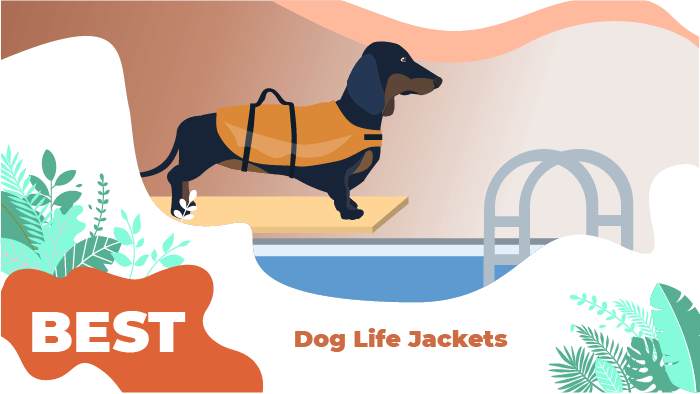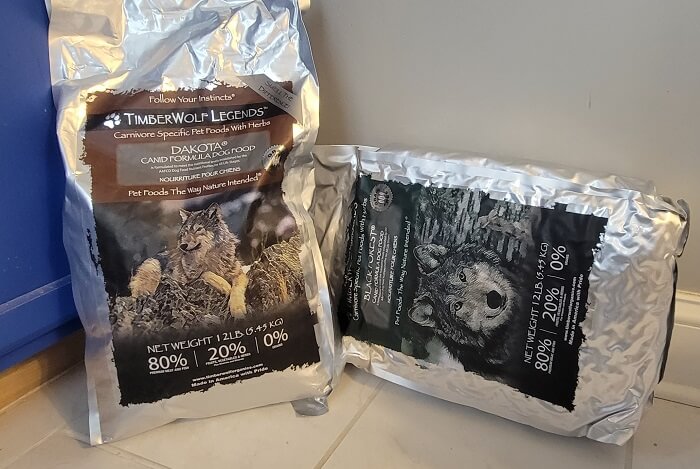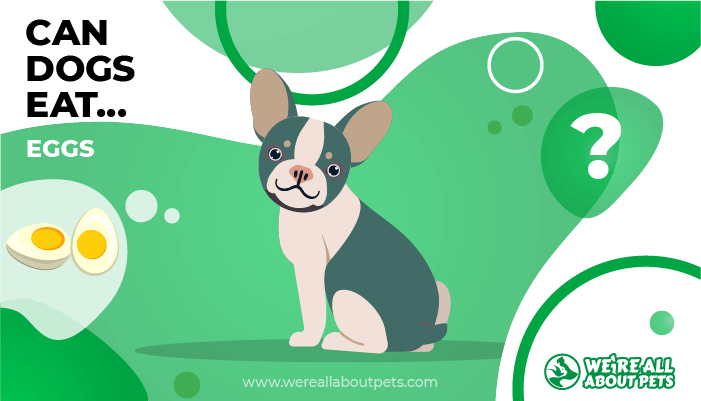Can Dogs Eat Carrots?
This page contains affiliate links. We may earn money or products from the companies mentioned in this post through our independently chosen links, which earn us a commission. Learn More
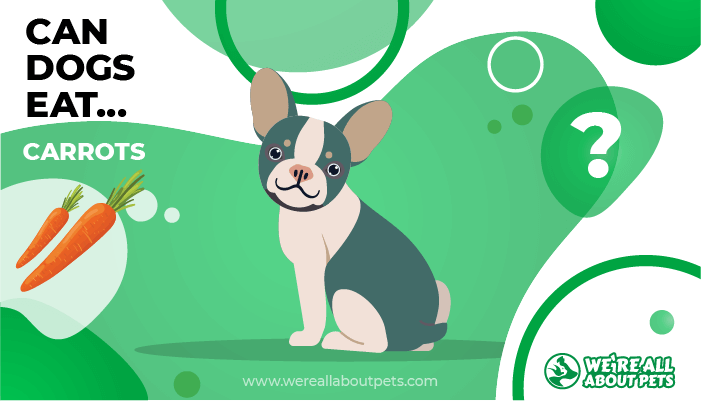
You might think of rabbits or horses when you imagine giving carrots as treats but have you considered giving carrots to your dog? Can dogs eat carrots?
In fact, dogs can eat carrots as long as they are cut up in small pieces. Many dogs love carrots as a healthy snack. Both cooked and raw, carrots can be a nutritious addition to your dog’s diet.
We can tell you more about the benefits of carrots for your dog below.
Carrot Nutrition Stats
Not all carrots are orange. They actually come in a wide range of colors but you’re most likely to find orange carrots in your supermarket.
A serving size for humans is one cup (128 grams). It contains:
- 52.5 calories
- 1.2 grams protein
- 0.3 grams fat
- 12.3 grams carbohydrates
- 3.6 grams dietary fiber
- Vitamin A 21383 IU (428% daily value)
- Vitamin C 7.6 mg
- Vitamin B6 0.2 mg
- Vitamin K 16.9 mcg
- Folate 24.3 mcg
- Choline 11.3 mg
- Potassium 410 mg
- Manganese 0.2 mg
One medium carrot has about 25 calories.
Carrots Nutritional Facts At A Glance
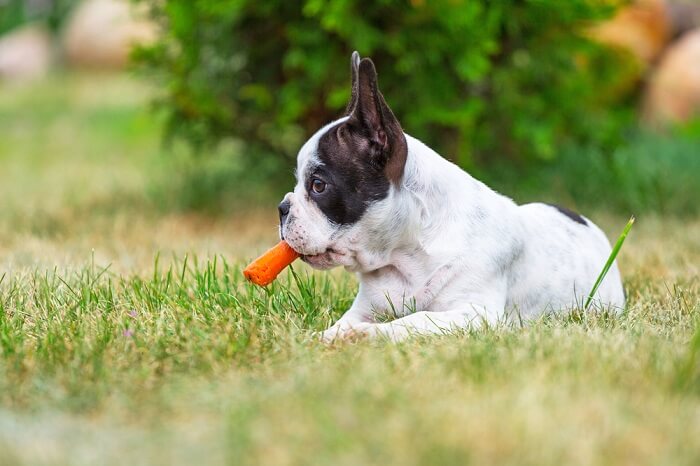
As you can tell from then numbers, carrots are a good source of vitamin A, vitamin C, vitamin K, and potassium, along with vitamin B6, folate, and manganese. They also supply good dietary fiber. They are often added to the formulas of commercial dog foods for some of these reasons.
In addition, carrots are very low in calories and fat. They contain only five percent fat with six percent protein.
On the down side, carrots are made up of about 89 percent carbohydrates. A large amount of the calories in carrots come from sugars such as sucrose, glucose, and fructose. If you enjoy carrots you probably know that they have a somewhat sweet taste.
Can Dogs Eat Carrots?
Yes, dogs can eat carrots. In fact, a hard carrot or a frozen carrot is sometimes recommended for a puppy when he’s teething. Some dog trainers like to use bite-size pieces of carrots as training rewards instead of using commercial treats which can have salt or other ingredients which might not be healthy for dogs. And, unlike pieces of hot dogs, for example, carrot pieces won’t stink up your clothes!
If you are giving your dog carrots it is important to cut them into small pieces so they don’t pose a choking hazard. This is especially true for small dogs.
Too many carrots or carrots cut in big pieces that your dog doesn’t chew well could also lead to an intestinal blockage so make sure you cut them in small pieces.
We do need to point out that dogs won’t usually benefit from the vitamins and minerals in raw vegetables such as carrots (or broccoli, or many other vegetables). Dogs aren’t very good at digesting the plant cellulose in these foods in a raw state.
If you want your dog to be able to digest these foods better you usually need to purée or pulverize them in a food processor, microwave them for a few seconds, or cook them another way such as steaming them. (But don’t boil them because that will leach out the nutrients.)
Are Carrots Good for Dogs?
Carrots are very good for dogs, in moderation. Carrots are loaded with beta-carotene and other carotene compounds which dogs can convert to vitamin A. Beta-carotene is an antioxidant that the body can use to make vitamin A. Of course, carrots also have plenty of vitamin A, too.
The dietary fiber in carrots is also good for your dog’s digestion. They have lots of soluble fiber that can add bulk to stools.
Some veterinarians also maintain that chewing on hard carrots is good for a dog’s teeth.
Since carrots are low in calories, your dog won’t gain weight from eating them.
How Much Carrot Can Dogs Eat?

As with many other vegetables and fruits, carrots do tend to contain a lot of natural sugar. That’s probably one reason why dogs like them so much. Dogs have a sweet tooth just as humans do. This means that you shouldn’t allow your dog to stuff himself on carrots just because he enjoys the taste of them, even if they do have health benefits.
In general, treats and snacks of any kind shouldn’t make up more than 10 percent of your dog’s daily calories. Since carrots contain lots of dietary fiber, keep in mind that you should start off with just a small amount so you won’t upset your dog’s digestion.
How much carrot you give your dog will depend on his size and other health factors, too. Half a carrot, cut into small pieces or carrot slices, would be enough to start.
How Often Can Dogs Eat Carrots?
If your dog is healthy with no diabetes or other health issues, you could give him some carrots a few times per week. But don’t give him too much at one time. Remember that carrots do contain a lot of fiber and sugars so they can affect your dog’s digestion, especially if he isn’t used to eating them.
If your dog has any health issues, such as diabetes, we do recommend that you consult with your veterinarian before giving him any carrots.
The Correct Diet Is Important
Dogs need to eat the correct diet for good health. This means that they require good quality protein and fat. Foods like carrots should only be given as an occasional treat. While there are many different ideas about good dog foods and different ways to feed dogs,
Here your dog needs the following in his diet:
- Good Sources of Protein- All dogs need good sources of animal protein in their diet. Meat, fish, poultry, and eggs are all good sources of animal protein.
- Good Sources of Fat- Fat provides essential fatty acids (EFA) and helps distribute the fat soluble vitamins A, D, E, and K so your dog’s body can absorb them.
- Named Ingredients- Look for named ingredients in your dog’s food and avoid generic ingredients. The more specific the ingredient is, the better. Otherwise, you don’t really know what you are feeding your dog.
- Low to Moderate Carbohydrates- Many dog foods are loaded with carbohydrates. This is true even with some good quality foods. Carbohydrates are not “bad” and they can be beneficial (dietary fiber can come from carbs, for example). But carbs should not be a substitute for protein.
- Avoid Artificial Preservatives, Colors, and Sweeteners- Artificial preservatives and colors/dyes have been linked to some health problems in humans and animals. You should try to avoid these ingredients in dog foods.
- AAFCO- AAFCO is the Association of American Feed Control Officials. AAFCO sets voluntary standards for pet food labeling. Look for foods that have these minimum standards.
- Fresh Water- All dogs need easy access to fresh water unless they are ill or have some other reason to be temporarily kept away from water. For example, if you are house training your puppy, it makes no sense to give him water overnight.
What Are Other Health Alternatives to Carrots In A Dog’s Diet?
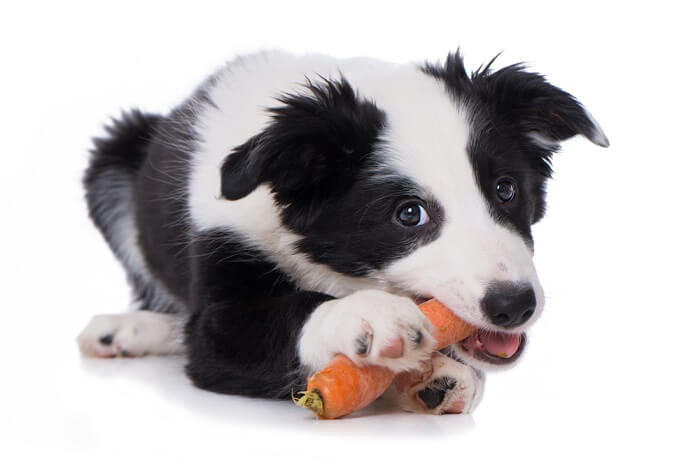
Carrots are a healthy treat but there are many other fruits and vegetables that can provide some of the same benefits. You should consider these foods as treats.
Check with your veterinarian if your dog has any health issues and you are concerned about giving any of these foods.
- Apples
- Asparagus
- Bananas
- Bell pepper
- Broccoli
- Brussels sprouts
- Cauliflower
- Cucumber
- Green beans
- Mangos
- Oranges
- Parsnip
- Pears
- Pineapple
- Pumpkin
- Strawberries
- Summer squash
- Sweet potato
- Tomatoes
- Zucchini
How Do You Give Your Dog Carrots
As mentioned, carrots make wonderful low-calorie treats if you are training your dog. They are easy to cut into small pieces; not messy; and many dogs love them raw.
You can buy regular carrots or baby carrots. They are both good. It’s easy to cut them up into small pieces and add them to your dog’s meals in small amounts. This can sometimes perk up an ordinary meal and make it more appealing to your dog.
If you have a juicer or food processor you can make carrot juice for your dog. Carrot juice is very high in vitamin A. If you are making it yourself you can add some of the pulp back into the juice before giving it to your dog.
You can also buy carrot juice in many stores. Remember to go easy and use moderation. Leftover carrot juice should be thrown out after about 48 hours. Most fresh juices won’t keep any longer.
If your dog prefers cooked carrots, try steaming and mash them for him. It’s easy to do.
- Boil water in a sauce pan
- Slice carrots into strips or small pieces and place them in a steamer basket over the boiling water
- Cover the sauce pan
- Steam the carrots for 8-10 minutes
- Drain the carrots into a colander
- Mash the carrots
You can also freeze carrots for your dog. Freezing a whole, large carrot can be a good way to let a puppy teeth. However, it’s not recommended to give a puppy a frozen baby carrot since this can be a choking hazard. Puppies shouldn’t have more than one large carrot per day.
Conclusion
Carrots make a wonderful treat for dogs, in moderation. Whether you are training your dog or giving him carrot pieces to satisfy his sweet tooth, they are loaded with beta-carotene and dietary fiber.
Check with your veterinarian if your dog has any health issues. Otherwise, carrots can be one of the healthiest treats you can give to your dog.






